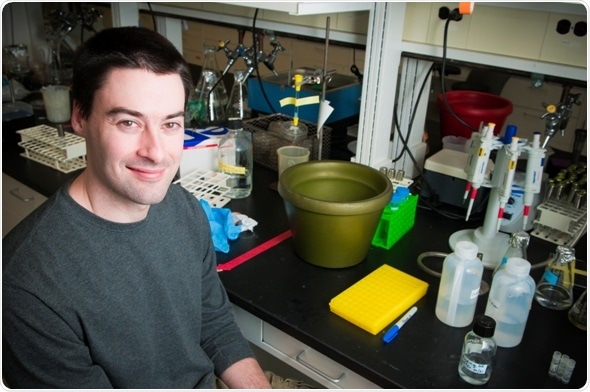Polysorbate, a safe additive found in everything from ice cream to cosmetics, has been proven to slow the toxic effects of E. coli poisoning.
Had this discovery been known before the deadly 2011 E. coli outbreak in Germany, doctors may have had one more tool to save some of victims.

Chris Waters, associate professor of microbiology and molecular genetics. Photo by G.L. Kohuth.
The findings, featured in the current issue of the journal Biofouling, show that polysorbates attack the protective biofilm in which E. coli lives and renders the deadly bacteria harmless, said Chris Waters, Michigan State University associate professor of microbiology and molecular genetics whose laboratory led the research.
“Biofilms are multicellular communities of bacteria that are usually encased in a protective slime,” he said. “We found that polysorbate 80 obliterates the biofilm and takes away the E. coli’s ability to damage the host during infection. We think this is due to blocking the ability of E. coli to produce toxin.”
Specifically, the team focused on the potent strain isolated from Germany that swept through Europe in 2011, causing thousands of infections and more than 50 deaths. This strain had been previously studied by Waters and Shannon Manning. Having samples of the bacteria at MSU helped the team, led by Rudolph Sloup, MSU microbiology and molecular genetics graduate student, isolate compounds that inhibited biofilms.
However, the results didn’t come easily. Waters and his team scoured scientific literature to identify anti-biofilm compounds, but none of them inhibited biofilms of this E. coli strain. Finally, the team found that the 20th compound tested, polysorbate 80, obliterated E. coli’s ability to form biofilms in the lab. The next step was to determine if the compound was effective in an animal model of the disease by administering polysorbate 80 to infected mice in their drinking water.
“During our animal infection studies, polysorbate 80 had no effect on the numbers of infecting E. coli. This was a little shocking, especially based on how promising our earlier tests had been,” Waters said. “Later, though, our pathology tests showed that polysorbate 80 essentially blocked all toxicity, even though it didn’t reduce the number of bacteria.”
The later confirmation of the successful in vivo experiment using mice models essentially showed that polysorbate 80 strips E. coli of its ability to cause disease allowing the bacteria to pass through the body’s intestinal tract without causing damage.
So instead of killing the E. coli like traditional antibiotics, a strategy that works until the E. coli develops resistance to the treatment, this finding suggests an anti-virulence strategy can be quite effective.
“Antibiotic use can often cause more harm than good with these types of E. coli infections because it causes the bacteria to release more toxin and it drives antimicrobial resistance,” Waters said. “Our results indicate that polysorbate 80 makes this strain of E. coli harmless, without these negative side effects. This approach also doesn’t disrupt patients’ natural microbiome leading to a healthier gut.”
Since polysorbate 80 is categorized as a GRAS (generally regarded as safe) compound, it doesn’t require FDA approval to be used as a treatment. Along with its potential for disarming the deadly German E. coli outbreak, polysorbate 80 could potentially help tackle more-common E. coli infections such as traveler’s diarrhea.
The next steps for this research will be to identify how polysorbate 80 inhibits biofilm formation and test its activity in other infection models.